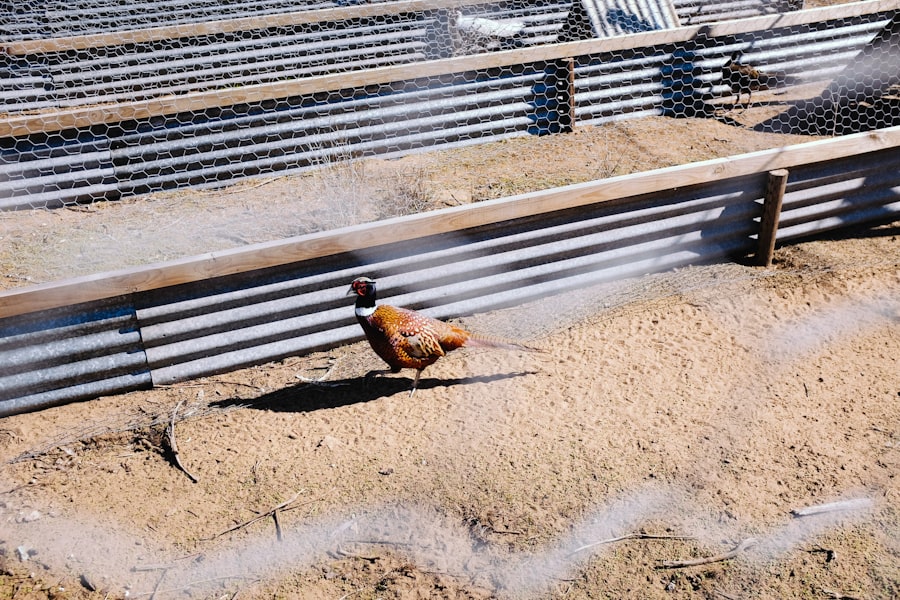Chickens are naturally curious and inquisitive animals with a strong instinct to forage, peck, and scratch for food. Understanding their behavior is essential for creating an optimal environment. Observing their natural behaviors helps in comprehending their needs and preferences, which is crucial for designing an appropriate living space.
As social animals, chickens thrive in flocks and establish a hierarchical system known as the pecking order. This social structure determines each chicken’s ranking within the group. Recognizing this hierarchy is important for managing flock behavior and preventing aggression or bullying among chickens.
Chickens also have an innate instinct to roost at night. Providing a safe and comfortable roosting area is vital for their well-being. By comprehending chicken behavior, caretakers can create living spaces that accommodate their natural instincts and offer a comfortable, enriching environment.
Table of Contents
- 1 Creating a designated foraging area for chickens
- 2 Using physical barriers to protect plants
- 3 Incorporating natural deterrents
- 4 Providing alternative sources of nutrition for chickens
- 5 Implementing training and behavior modification techniques
- 6 Regular monitoring and maintenance
- 7 FAQs
- 7.1 What are some effective ways to keep chickens from eating your plants?
- 7.2 What types of plants are chickens most likely to eat?
- 7.3 Are there any plants that chickens will not eat?
- 7.4 Can I train my chickens to avoid eating my plants?
- 7.5 Are there any natural deterrents that can help keep chickens away from plants?
Key Takeaways
- Chickens have natural foraging and scratching behaviors that can be managed and directed
- Designating a specific area for chickens to forage can help protect plants and minimize damage
- Physical barriers such as fencing and netting can be used to protect plants from chicken foraging
- Natural deterrents like predator decoys and strong-smelling plants can help deter chickens from certain areas
- Providing alternative sources of nutrition such as feeders and treats can help redirect chicken foraging behavior
Creating a designated foraging area for chickens
Enclosing a Section of Your Yard or Garden
One effective way to create a designated foraging area is by using chicken wire or fencing to enclose a specific section of your yard or garden. This will allow the chickens to roam and forage freely within the designated area while preventing them from accessing other parts of your property.
Using Movable Chicken Tractors or Pens
Another option for creating a designated foraging area is by using movable chicken tractors or pens. These portable enclosures can be moved around your yard or garden, allowing the chickens to forage in different areas while still protecting your plants and landscaping.
Providing a Dedicated Space for Foraging
Additionally, you can create a designated foraging area by providing chickens with a dedicated space filled with loose soil, sand, or mulch where they can scratch and peck to their heart’s content. By creating a designated foraging area for chickens, you can help satisfy their natural instincts while also protecting your garden and landscaping from damage.
Using physical barriers to protect plants
Using physical barriers is an effective way to protect your plants from the natural behaviors of chickens. One option is to use chicken wire or fencing to create a barrier around your garden or landscaping. This will prevent chickens from accessing the plants and digging up the soil, while still allowing them to roam freely in other areas of your yard.
Another option is to use raised garden beds or containers to grow your plants. By elevating your plants off the ground, you can prevent chickens from pecking at them and causing damage. Additionally, using cloches or row covers can help protect your plants from chickens.
These protective coverings can be placed over individual plants or entire rows to prevent chickens from accessing them. Another effective physical barrier is using netting or mesh to cover your plants. This will prevent chickens from reaching the plants while still allowing sunlight and water to reach them.
By using physical barriers to protect your plants, you can create a safe and secure environment for your garden and landscaping while still allowing your chickens to roam freely.
Incorporating natural deterrents
Incorporating natural deterrents is another effective way to protect your plants from the behavior of chickens. One natural deterrent is using strong-smelling herbs and plants, such as lavender, mint, or rosemary, around your garden or landscaping. Chickens are sensitive to strong smells and will often avoid areas where these plants are present.
Another natural deterrent is using predator decoys, such as fake owls or hawks, to scare off chickens. The sight of these predators can deter chickens from entering certain areas of your yard or garden. Additionally, using motion-activated sprinklers can help deter chickens from accessing your plants.
The sudden burst of water will startle the chickens and discourage them from returning to the area. Another natural deterrent is using reflective objects, such as CDs or mirrors, to create flashes of light that will scare off chickens. By incorporating natural deterrents, you can effectively protect your plants from the behavior of chickens while also creating a visually appealing and enriching environment for them.
Providing alternative sources of nutrition for chickens
Providing alternative sources of nutrition for chickens is essential in redirecting their natural foraging behaviors away from your garden and landscaping. One option is to provide chickens with a dedicated foraging area filled with edible plants, insects, and other natural food sources. This will satisfy their instinctual behaviors while also preventing them from seeking out food in your garden.
Additionally, you can supplement their diet with kitchen scraps, fruits, and vegetables to provide them with additional nutrition and enrichment. Another option is to provide chickens with specially formulated feed that meets their nutritional needs. By ensuring that they have access to a balanced diet, you can help reduce their need to forage for food in your garden.
Additionally, providing chickens with access to grit and oyster shells can help support their digestive health and provide them with essential minerals. By providing alternative sources of nutrition for chickens, you can help satisfy their natural instincts while also protecting your garden and landscaping from damage.
Implementing training and behavior modification techniques

Positive Reinforcement
One effective technique is using positive reinforcement to train chickens to avoid certain areas or behaviors. By rewarding them with treats or praise when they exhibit desired behaviors, you can help encourage them to behave in a more desirable manner.
Deterrents and Redirection
Another technique is using deterrents, such as noise makers or water sprays, to discourage chickens from accessing certain areas of your yard or garden. By creating negative associations with specific behaviors or locations, you can help modify their behavior over time. Additionally, providing chickens with plenty of enrichment, such as toys and perches, can help redirect their energy and prevent them from seeking out destructive behaviors.
Long-Term Behavior Modification
By consistently using these techniques, you can help modify your chickens’ behavior over time and create a more harmonious coexistence between your flock and your garden.
Regular monitoring and maintenance
Regular monitoring and maintenance are essential in managing the behavior of chickens and protecting your garden and landscaping. By regularly observing the behavior of your chickens, you can identify any potential issues or areas of concern before they escalate. Additionally, maintaining physical barriers and natural deterrents will help ensure that your plants are protected from the behavior of chickens.
Regularly inspecting your garden and landscaping for any signs of damage will allow you to take proactive measures to address any issues before they become more severe. Additionally, providing regular care and attention to your chickens, such as ensuring they have access to proper nutrition and enrichment, will help prevent them from seeking out alternative sources of food in your garden. By implementing regular monitoring and maintenance practices, you can create a harmonious environment for both your chickens and your garden and landscaping.
In conclusion, understanding the behavior of chickens is crucial in creating a suitable living space for them to thrive in. By creating a designated foraging area, using physical barriers, incorporating natural deterrents, providing alternative sources of nutrition, implementing training techniques, and regularly monitoring and maintaining their environment, you can effectively manage the behavior of chickens while protecting your garden and landscaping from damage. With proper care and attention, you can create a harmonious environment where both your chickens and plants can coexist peacefully.
If you’re struggling with keeping chickens from eating your plants, you may want to check out this article on how to build a chicken coop in Chester, SC. It offers valuable tips on creating a safe and secure space for your chickens, which can help prevent them from wandering into your garden and munching on your plants.
FAQs
What are some effective ways to keep chickens from eating your plants?
Some effective ways to keep chickens from eating your plants include using physical barriers such as fences or netting, providing alternative sources of food and entertainment for the chickens, and using natural deterrents such as spicy or bitter plants.
What types of plants are chickens most likely to eat?
Chickens are most likely to eat tender, young plants such as leafy greens, herbs, and certain vegetables. They may also be attracted to fruits and berries.
Are there any plants that chickens will not eat?
Chickens tend to avoid plants with strong odors or flavors, such as herbs like rosemary, lavender, and mint. They also typically avoid plants with tough or spiky leaves.
Can I train my chickens to avoid eating my plants?
Yes, you can train your chickens to avoid eating your plants by providing them with plenty of alternative food sources, using positive reinforcement techniques, and consistently redirecting their behavior away from the plants.
Are there any natural deterrents that can help keep chickens away from plants?
Yes, natural deterrents such as planting strong-smelling herbs like garlic and onions, or using spicy plants like hot peppers can help deter chickens from eating your plants. Additionally, using physical barriers like chicken wire or netting can also be effective.
Meet Walter, the feathered-friend fanatic of Florida! Nestled in the sunshine state, Walter struts through life with his feathered companions, clucking his way to happiness. With a coop that’s fancier than a five-star hotel, he’s the Don Juan of the chicken world. When he’s not teaching his hens to do the cha-cha, you’ll find him in a heated debate with his prized rooster, Sir Clucks-a-Lot. Walter’s poultry passion is no yolk; he’s the sunny-side-up guy you never knew you needed in your flock of friends!







